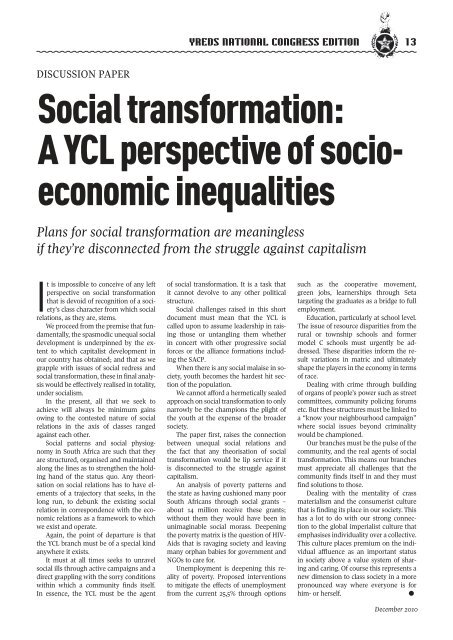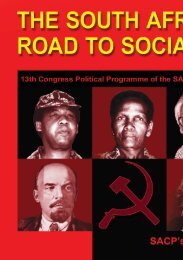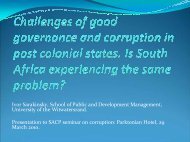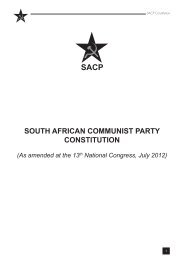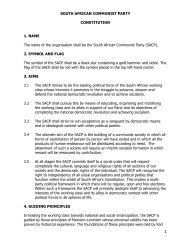YCL CONGRESS EDITION - South African Communist Party
YCL CONGRESS EDITION - South African Communist Party
YCL CONGRESS EDITION - South African Communist Party
You also want an ePaper? Increase the reach of your titles
YUMPU automatically turns print PDFs into web optimized ePapers that Google loves.
DISCUSSION PAPER<br />
Social transformation:<br />
A <strong>YCL</strong> perspective of socioeconomic<br />
inequalities<br />
Plans for social transformation are meaningless<br />
if they’re disconnected from the struggle against capitalism<br />
It is impossible to conceive of any left<br />
perspective on social transformation<br />
that is devoid of recognition of a society’s<br />
class character from which social<br />
relations, as they are, stems.<br />
We proceed from the premise that fundamentally,<br />
the spasmodic unequal social<br />
development is underpinned by the extent<br />
to which capitalist development in<br />
our country has obtained; and that as we<br />
grapple with issues of social redress and<br />
social transformation, these in final analysis<br />
would be effectively realised in totality,<br />
under socialism.<br />
In the present, all that we seek to<br />
achieve will always be minimum gains<br />
owing to the contested nature of social<br />
relations in the axis of classes ranged<br />
against each other.<br />
Social patterns and social physiognomy<br />
in <strong>South</strong> Africa are such that they<br />
are structured, organised and maintained<br />
along the lines as to strengthen the holding<br />
hand of the status quo. Any theorisation<br />
on social relations has to have elements<br />
of a trajectory that seeks, in the<br />
long run, to debunk the existing social<br />
relation in correspondence with the economic<br />
relations as a framework to which<br />
we exist and operate.<br />
Again, the point of departure is that<br />
the <strong>YCL</strong> branch must be of a special kind<br />
anywhere it exists.<br />
It must at all times seeks to unravel<br />
social ills through active campaigns and a<br />
direct grappling with the sorry conditions<br />
within which a community finds itself.<br />
In essence, the <strong>YCL</strong> must be the agent<br />
of social transformation. It is a task that<br />
it cannot devolve to any other political<br />
structure.<br />
Social challenges raised in this short<br />
document must mean that the <strong>YCL</strong> is<br />
called upon to assume leadership in raising<br />
those or untangling them whether<br />
in concert with other progressive social<br />
forces or the alliance formations including<br />
the SACP.<br />
When there is any social malaise in society,<br />
youth becomes the hardest hit section<br />
of the population.<br />
We cannot afford a hermetically sealed<br />
approach on social transformation to only<br />
narrowly be the champions the plight of<br />
the youth at the expense of the broader<br />
society.<br />
The paper first, raises the connection<br />
between unequal social relations and<br />
the fact that any theorisation of social<br />
transformation would be lip service if it<br />
is disconnected to the struggle against<br />
capitalism.<br />
An analysis of poverty patterns and<br />
the state as having cushioned many poor<br />
<strong>South</strong> <strong>African</strong>s through social grants –<br />
about 14 million receive these grants;<br />
without them they would have been in<br />
unimaginable social morass. Deepening<br />
the poverty matrix is the question of HIV-<br />
Aids that is ravaging society and leaving<br />
many orphan babies for government and<br />
NGOs to care for.<br />
Unemployment is deepening this reality<br />
of poverty. Proposed interventions<br />
to mitigate the effects of unemployment<br />
from the current 25,5% through options<br />
such as the cooperative movement,<br />
green jobs, learnerships through Seta<br />
targeting the graduates as a bridge to full<br />
employment.<br />
Education, particularly at school level.<br />
The issue of resource disparities from the<br />
rural or township schools and former<br />
model C schools must urgently be addressed.<br />
These disparities inform the result<br />
variations in matric and ultimately<br />
shape the players in the economy in terms<br />
of race.<br />
Dealing with crime through building<br />
of organs of people’s power such as street<br />
committees, community policing forums<br />
etc. But these structures must be linked to<br />
a “know your neighbourhood campaign”<br />
where social issues beyond criminality<br />
would be championed.<br />
Our branches must be the pulse of the<br />
community, and the real agents of social<br />
transformation. This means our branches<br />
must appreciate all challenges that the<br />
community finds itself in and they must<br />
find solutions to those.<br />
Dealing with the mentality of crass<br />
materialism and the consumerist culture<br />
that is finding its place in our society. This<br />
has a lot to do with our strong connection<br />
to the global imperialist culture that<br />
emphasises individuality over a collective.<br />
This culture places premium on the individual<br />
affluence as an important status<br />
in society above a value system of sharing<br />
and caring. Of course this represents a<br />
new dimension to class society in a more<br />
pronounced way where everyone is for<br />
him- or herself.<br />
l<br />
December 2010


